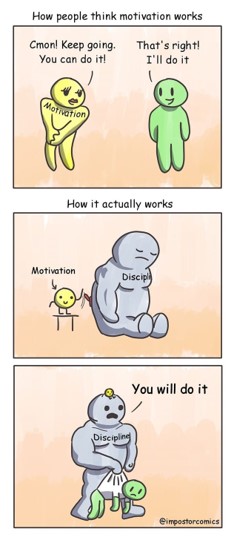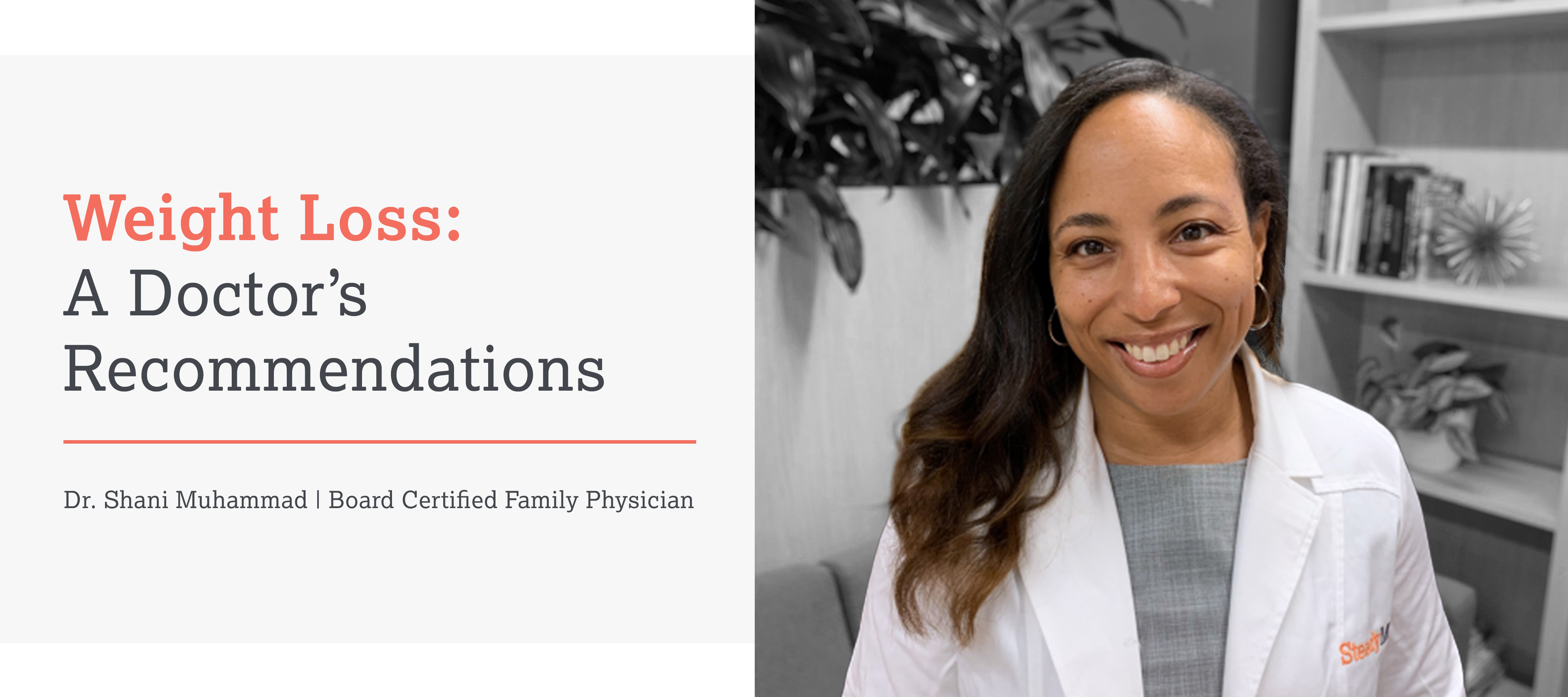What’s the healthiest way to lose weight? How can I meet my goal in X amount of time? What actually works? Why is this hard to navigate?
You asked and we answered. Dieting and weight loss can be a tricky subject to understand and each person’s medical history, lifestyle and goals are different. SteadyMD Dr. Shani Muhammad understands the struggle that comes with weight loss, as she has battled it herself.
Dr. Shani is board certified in family medicine, has a nutritional science degree, and has lost over 50 pounds through diet and lifestyle changes. We asked her the tough questions about dieting. Here’s what she said:
What Haven’t I Tried?
I have tried Weight Watchers (on three separate occasions), Atkins, Paleo, Whole30, IIFYM (macro counting), Keto, IF, 2B method (beach-body), 90 Day Shred (Jillian Michales), Skinny Rules (Bob Harper) and intuitive eating.
How Do I Find Sustainability?
I tried all of these diets hoping for something sustainable that would give me results and not be too challenging. I would read about or hear about someone doing something that had given them amazing results, or perhaps see a new diet from a health professional I respected and want to believe that perhaps in the past the problem had been the diet.
So I was always looking for that “thing” that would finally be the answer. I will say that what has been working consistently for me now is flexible dieting with macro counting (IIFYM) with intermittent fasting (IF) eating mostly a more Paleo-ish diet with largely whole food sources. I say Paleo-ish because I do allow myself the flexibility to have rice or bread on weekends when I want it, or dessert without regret or fear.
Why Diet?
The medical benefits of weight loss are many and varied. Anywhere from improved sleep, less joint pain, more energy, improved sexual health, and libido, lower risk of heart attack and stroke, improved blood sugar control and lower risk of diabetes, lower risk of cancer.
What if I’m Losing my Motivation?
Motivation is like your car battery. You can’t drive on it. It gives the initial charge to start the car, but if you try to drive on battery power, you’re going to die out quickly. The alternator keeps the battery charged so you can keep driving.
Similarly, creating habits that become a thing you can’t easily stop doing, is the alternator to your battery of “motivation.” It continues to drive you. No one will be motivated every day and motivation wanes so quickly it’s insane. Instead, you have to decide to become the kind of person who does the things it is you want to do. If your goal is to be fit, you have to decide to do the things that fit people do every day.

How Do I Know If I’m Ready?
It becomes a habit and you create a discipline for yourself that fuels you even when it’s no longer fun. It’s something you truly have to be ready for. And if you’re not ready, that’s ok, but you’ll have to accept that you won’t get the results yet either. I find it helpful to belong to fitness groups on social media and to follow weight loss, recipe, or fitness pages on IG because seeing other people’s transformations inspires me. Especially when I find someone I can relate to, so I know if they can do it, so can I.
What’s the Hardest Part About Dieting?
What I struggled most with on all other diets before now was the cutting out of entire food groups and feeling deprived. Now, I have the flexibility to truly eat whatever I want, as long as it is under my calorie goal and I hit my protein macronutrient goal.
I know that my body FEELS better when I eat a more balanced diet consisting of mostly meat and veggies with some nuts and seeds and less processed or refined starchy foods. So I save that for occasions when I really want it, and limit it to no more than one serving on a weekend day. That keeps me from feeling deprived.
What if I Can’t Cook?
The easiest dishes to make for sure were the Keto meals. Largely meat and dairy without a lot of veggies to cut up! (ha). Seriously though, there are easy and challenging meals in every diet plan. If cooking is not your thing, you can find 10-30 minute recipes or meal ideas online for any plan.
I don’t really enjoy traditional meal prep where you make all your food for the week say on a Sunday and then eat from containers every day. But I will cut up all my chicken on a Sunday and saute it for easy grab and go meals like chicken on top of a salad, chicken with rice and veggies, or scrambled into my eggs.
I like to keep Monday-Friday pretty simple and noncomplicated. Animal protein (meat, poultry, fish) and veggies. Eggs + (turkey) bacon. Cottage cheese, nuts, and fruit. I eat the same things over and over during the week.
Doctor Shani’s Advice:
-
- Coaching is helpful. They don’t have to be in person. Online coaching from a health professional who understands nutrition and can help you set up your eating plan is a valuable tool and helps create accountability. However, if you can’t afford that or it’s not your thing…
- Find a buddy or even better a tribe. We are more successful when we have people to emulate, inspire us and hold ourselves accountable to. Whether this is a gym buddy, members of your boot camp class, an online group, or a walking partner, having someone or someones who are also engaged in the same journey as you to relate to goes a long way towards helping people stick to their goals.
- Teas, wraps, shakes, and supplements aren’t magic and won’t make you burn fat. Don’t waste your money.
- It will probably take longer than you expect, so be patient.
- Exercise is not necessary for weight loss, but that doesn’t mean you shouldn’t do it. Exercise has many benefits such as improved mental health and wellbeing, improved heart health, stronger bones, better balance, memory preservation, and more energy. Studies have shown exercise to be more important at maintaining weight loss than initial weight loss, but that doesn’t mean you shouldn’t do it.
About Me: Dr. Shani Muhammad
I’m a family doctor and what that means is that I was trained to take care of patients from cradle to grave and everything in between.
I love to talk to my patients about their workouts, health, fitness, and nutrition. I have a nutritional science degree so while a lot of physicians didn’t get a lot of information about nutrition in med school (it’s not required!) or don’t feel comfortable talking about diet. I do.
My Partnership with You
I spend a lot of time talking to my patients about their diets. Whether they want to do keto, paleo, Whole30, or if they just want to find a way to eat a balanced and healthy diet then I encourage my patients to follow me on MyFitnessPal and I’ll follow them so that I can see their food diary and they can see mine.
They can get ideas from what I eat and I can get ideas from what they eat. It’s really a partnership. It’s not me dictating what to eat to them, it’s about sharing this process together. I want to see your rides on Peloton, your workouts on MyFitnessPal, or your progress on Fitbit.
